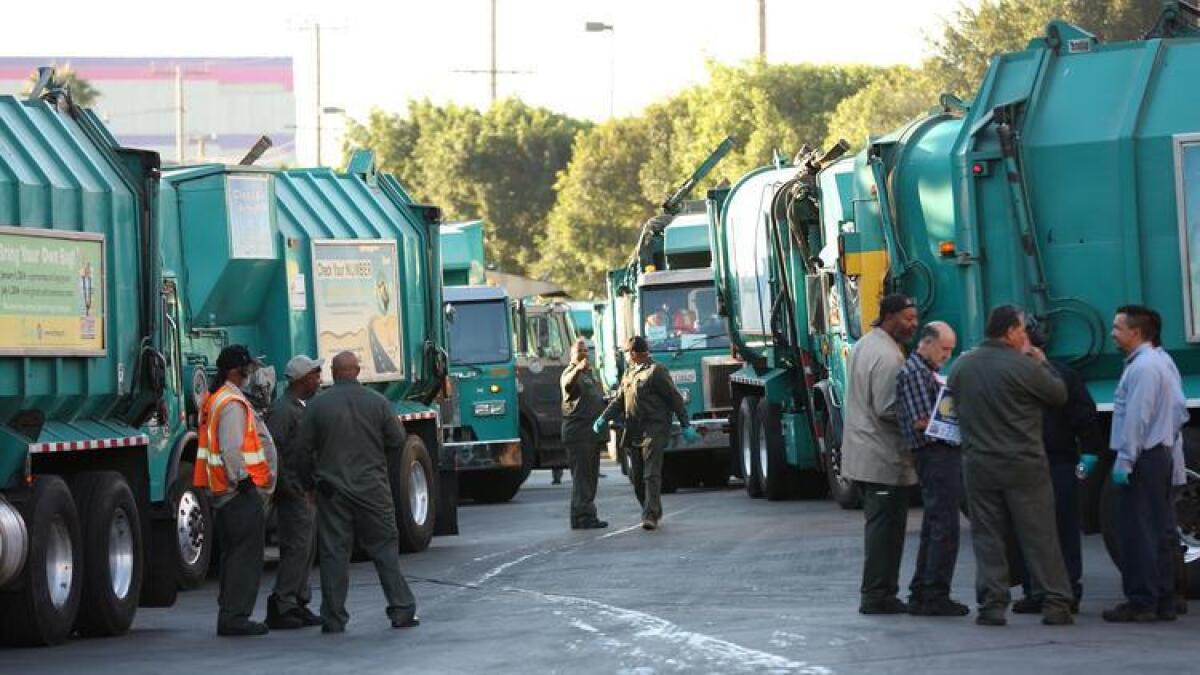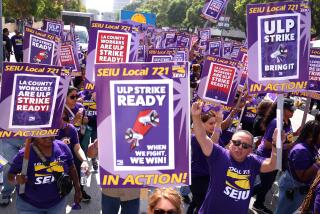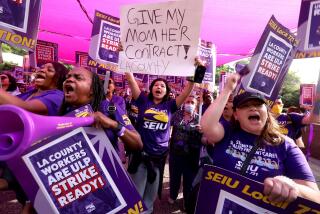Contract talks stalled, thousands of L.A. city workers take strike vote

- Share via
Angered by stalled contract negotiations, at least 10,000 Los Angeles city workers will decide whether to strike, a move that could potentially paralyze basic city services such as garbage collection, sewer maintenance and transportation.
The vote called by leaders of the Service Employees International Union is the latest escalation in a months-long standoff between Mayor Eric Garcetti’s administration and the unions representing a broad range of public employees such as clerical workers, garbage truck drivers, traffic officers and others.
A leaflet obtained by the Los Angeles Times that is now being distributed to SEIU members at city job sites says that the union’s leadership “recommends a strike vote because of the lack of movement by the city at the bargaining table.”
SEIU Local 721 spokeswoman Coral Itzcalli confirmed that the union has authorized a strike vote but would not comment on when and how the vote would take place. It’s also unclear if other workers represented by the Coalition of LA City Unions — an umbrella labor group that includes and typically acts in concert with the SEIU — will conduct a strike vote as well. Coalition participation would increase the number of employees who could walk off the job to 20,000, or more than half the city’s civilian workforce.
“They’re extremely frustrated,” Itzcalli said of union negotiators. “To date, L.A. city officials have failed to present an acceptable proposal.”
If union members approve a strike, it doesn’t guarantee that they will follow through — although it could increase pressure on Garcetti and other city leaders to reach an agreement. Even after the vote, union leaders will have the discretion to avoid a work stoppage depending on how contract talks proceed.
News of the vote came as hundreds of city employees failed to show up for work Wednesday in what city officials believe was a coordinated labor action. About half of Los Angeles’ 350 traffic officers called in sick, said Bruce Gillman, spokesman for the city’s Department of Transportation. About 60% of garbage truck drivers were also absent, causing delays in the collection of recycling and yard waste bins. Sanitation department spokeswoman Tonya Durrell said garbage was being picked up on schedule.
Coalition and SEIU officials denied organizing the “sick-out,” which drew criticism from Garcetti at a midday news conference on unrelated issues.
“The table is the best place to resolve any grievances that people have, not the streets of Los Angeles,” Garcetti said.
The mayor’s office would not comment in detail on SEIU’s call for a strike vote. “We remain committed to reaching a fair and responsible contract at the negotiating table,” Garcetti spokesman Yusef Robb said in a statement.
The vote comes after almost a year of contract talks between the coalition and city officials. Sticking points have included the city’s demands that workers forgo raises for three years and contribute more to their retirement costs and healthcare premiums. Many coalition workers now pay no premiums.
The coalition’s last contract, secured in 2007 shortly before the Great Recession, included 24.5% pay increases over several years. Union leaders argue that despite those raises their employees have suffered because of the city’s budgetary woes, agreeing to furlough days and greater contributions to their pension costs.
The coalition is the last large labor group not to negotiate a new contract since Garcetti took office in 2013. Coalition employees have been working without a contract since last summer, and tension has mounted as the impasse has dragged on. In February, members of the group staged demonstrations during breaks from work across the city.
Union leaders are predicting much more serious disruptions of city services if a strike is called. A Strike Authorization Q&A distributed to SEIU members says that striking workers would “stay out the entire day and won’t return to complete the day’s tasks. This way, the City Managers will feel the effects of the strike in a way they didn’t before.”
Times staff writer Emily Alpert Reyes contributed to this report.
Twitter: @petejamison
More to Read
Sign up for Essential California
The most important California stories and recommendations in your inbox every morning.
You may occasionally receive promotional content from the Los Angeles Times.












